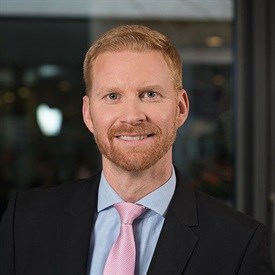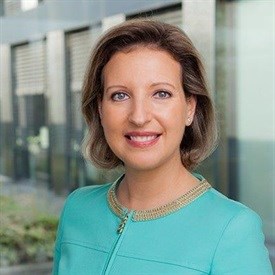Tourism is an industry which contributes significantly to any country's GDP. Across the globe, it has created opportunities for people, travellers to experience destinations in newer, better and unforgettable ways. But, as a hospitality or tourism offering, have you been developing your employees and their skills to adapt to guests' or clients' needs?
The industry is changing every day, and it's become best practice to identify how the industry as a whole can better itself to increase its standards and its contribution to the economy, including the lives of those that take part in its growth, whether that is from a guest's perspective, or an employee's.
We caught up with Dr Achim Schmitt, Associate Dean Graduate Programme and Valerie De Corte, Alumni and Industry Relations Director for Ecole Hoteliere de Lausanne (EHL) during the recent THINC Africa 2018 conference.
Here, Schmitt and De Corte share how EHL hospitality school is changing the narrative when it comes to the of quality students it produces, and how South Africa, Africa and the rest of the world can do their part and make a difference...
How can young South Africans and Africans get a foothold in the hospitality industry?
Schmitt: I don’t think it’s only limited to the region. The hospitality industry is a good industry to step into professionally - entry standards are lower than other industries, so in that respect, the industry actually employs and serves as a platform for education and development or access to the labour market. It's also a gateway to other careers. I think overall the industry is in good shape to promote this sort of development. Individual companies, however, should be more open and embrace, prioritise educational efforts for communities and townships in Africa.
The more they are open and willing to invest in local labour, the better it will be in the long term. We at EHL are well-equipped in vocational training that is hands-on, which can also be transferred into business – from service orientation to customer orientation; the students learn, or people learn, that coming into hospitality - jobs can be easily transferred into other jobs afterwards.
De Corte: South Africa definitely has an advantage. It is a tourism destination and compared to other countries, it's capable of creating a strong presence. I think, as there is a basis for education, which is higher than other countries in Africa – it could definitely work, especially with regards to partnerships with schools and universities like EHL, for instance. I think it's important to make both national and international matches.
It’s not only about building relationships with nationals. It's about being diverse. It would definitely help people in finding new ideas and pushing themselves forward. It’s no longer just about staying amongst yourselves – we need to incentivise. As Achim said, is not about the state or politicians; it's more about the companies and them forming partnerships and finding ways to provide lifelong learning.
Incorporating hospitality sectors and hospitality aspects into the EHL learning – tell us why it’s so crucial to include all of these, with reference to multi-discipline learning, for preparation?
Schmitt: It comes with the demands of the industry. The industry was traditionally an industry that was three-dimensional and given the service level and demands of customers, the way the context of hospitality is done is expanding and rapidly changing. Technology is taking over – we will have certain interfaces to work within the future when you serve and promote a service offering; I think in the future, you need to be able to integrate a more holistic approach when it comes to the educational journey for students than just training them on one subject. By branching out, you provide them with the opportunity to be more agile and flexible in their job.
How we integrate these aspects moving forward will be the deciding factor, no matter which stage of your career you are in. We're moving toward openness and flexibility in education that allows one to not only have a good foundation, but to also have a foundation to develop yourself throughout your career. It's about moving through life's journey rather than a timely learning experience. This multi-dimensionality is what the industry needs when adopting new curriculums for the future.
De Corte: We're moving toward a digital age – there's a need to focus on the client and guests more than ever. Every company is looking for talent that could interact easily and professionally with guests. It's not only in hospitality - it covers a whole range of sectors. For us, however, this is our core business - this is why employers all over the world appreciate what we are establishing and creating; it's not just about learning new skills, everyone can learn something, but it's about having learners "chameleonise" themselves within the industry - to be adaptable, to live it - it's innate. It's not anything that you can learn on the internet or from a book, and that makes the difference.
What differentiates the EHL students – how do you maximise on this?
De Corte: The EHL students can rapidly adapt to any kind of sector - having a curriculum that exposes them to be able to deal with luxury brands, clinics, the consulting and insurance industry, the banking sector, etc. – they definitely need to be equipped with a range of skills. During their four years of education, they are offered hands-on internship experience - it's a natural progression and provides them with an example of what the real working world is like.
Schmitt: Three aspects differentiate our school from others.
We have a heritage of 125 years in hospitality education and once you are on our campus, you will feel our commitment to the industry - this translates into a passion that we communicate and our students feel that passion. We believe that they should care as much as we do, and you can feel that care on campus.
The second thing is, we have over 100 different nationalities on our campus; so we are culturally agile. We can place our students in any cultural arena.
The last thing that we do really well is guiding them into the practical application of things. As my colleague mentioned, the two internships – it doesn’t end there. Often, we have industry professionals come into our classroom and talk to our students, wanting to know what they think. They want to know and want to also learn from our students. That openness and that exchange, I think its unique and not easily replicated. We are fortunate to have 25,000 alumni, who bring a certain passion and commitment to our school.
De Corte We have what you call an EHL Spirit, a zest for hospitality. The connection between alumni is opening doors, which strengthen the network across the globe - to be a part of the same family. For us, values are so important as a community. Our community is just that, a community - it's not about individualism. We work as a group, within group initiatives as much as possible. That is why our students are so well prepared.
What is your focus on South Africa?
Schmitt Overall, we focus on Africa as a continent, and of course South Africa given the role the country plays in the tourism industry. I don't only want to focus on South Africa, but one of our focus areas is to bring knowledge from more developed regions in order to avoid mistakes that are commonly made. South Africa is slowly growing and to be able to be a part of this growth or this emerging growth, is a unique opportunity; to plant seeds that one can actually make use of, to preserve environmental resources and to engage in conversation with local communities, building infrastructure that makes sense and is sustainable; to bring a certain educational standard in the industry to the fore to help the country better develop.
We thought that it's time for us to branch out and create a community here in South Africa as well. We're not here to tell you what you should do, we want to learn with you, teach best practices, establish them - that are locally adaptable to the country's context. If we just come and give you anything on education and you can't apply it, then it's not worth it or of educational value. Learning and better understanding it and slowly developing customised programmes is the route to go when it comes to Africa.
De Corte: It's also about preserving local culture. We don't want to impose ours. We want to be a part of South Africa's, understand and experience it.
What are your plans for the region and the rest of Africa?
Schmitt: It goes hand-in-hand with what I mentioned before. Our plan for the region is to fundamentally become a viable partner - a partner that is a platform for hospitality education that is open to new concepts, a sounding board that can help locals find answers that they are looking for. We want to engage in education and not have this idea of limited commercial education. It's also to help build other schools up, and other educational standards in the country, where we can bring a sense of quality. We are committed to lead, to pioneer education within the industry. We don't want to it all on our own. We are open to partnerships and would like for others to participate in this as well. We are looking to help grow the industry and assist where we can.
What are the sort of partnerships you are looking to establish?
Schmitt: We'd like to align with brands or people with the same goal in mind. We'd like to do things properly. We are always open and are always willing to share best practices, but we also need to be aware of where our biggest impact can be and work toward bringing that change.
What are the major trends that you are seeing in the market? And how can South Africa and the rest of the world adapt to them?
Schmitt: There are three major trends that I always discuss:
1. IT and big data: Touchpoints with clients will decrease and increase in quality.
2. Millennials: As customers and as a workforce – how can you manage and how can you deliver to this clientele in the future? What is often forgotten is how to actually manage and/ or differentiate between the two.
3. Sustainability in every sense from an economic, social or an environmental sense: How can you embrace the community and incorporate natural resources into the industry and into business models? I think that that is a big challenge and a big question that most national brands and corporations have to ask themselves in the future.
If you have those three trends under control, you are very well equipped, if not, you can't be prepared. You need to be aware of them.






































